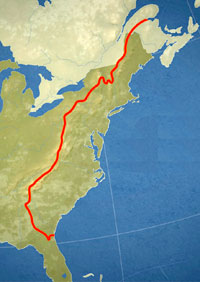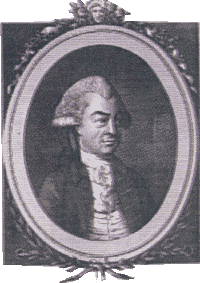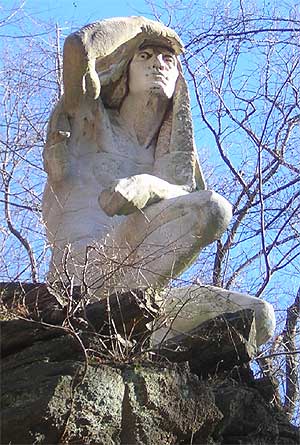

Temple's Diary
A Tale of Benjamin Franklin's Family
In the Days Leading up to The American Revolution
It was our best gallop so far and when we stopped to let the horses catch their breath, we sat in the sun, my father and I, in the middle of a meadow. Father, who usually keeps silent during these pauses — at least until I start pestering him with questions — opens the conversation.
— "Temple," he says, "I know you like to hear about my past expeditions with your grandfather. There is one adventure — no, I should say a dream — I have not told you about. It was our boldest idea ever, quite a joint project that would both bring more glory to the British Empire, and quite a fortune to the Franklin family for generations to come ...
— "Tell me, tell me!" (The generations to come, that's me!)
— "We were to be equal partners, he and I, joining forces with a few prosperous, enterprising Philadelphia merchants, we would go into beautiful, fabulous new territories and settle them ..."
— "But where are they, those fabulous new territories?"
— "In the West. This project started just ten years ago but I had been West long before that. When I was just a few years older than you are now, I crossed the Allegheny Mountains and entered what was called the Ohio Territory, where most of our neighbors — and they weren't very close — were Indians. My traveling companion was a German, Conrad Weiser, a man well acquainted with Indian languages and habits. He served as interpreter.
The overwhelming wish to settle there never left me after that, but there were many obstacles. No purchase of Indian land could be made without the consent of the tribal chief and approval from the Court in England. Nothing, theoretically, could be acquired west of what was called the Proclamation Line though, in fact, there were exceptions."
 Proclamation Line of 1763
Proclamation Line of 1763— "When was that Proclamation Line proclaimed and where was it?
— "It was proclaimed, as you say, in 1763 and reserved for the Indians the territories located west of the rivers that flow into the Atlantic. Temple, I cannot go into every detail of this hugely complicated topic. I'll just tell you that along with your grandfather and those partners I mentioned we formed the Illinois Company. I conceived and wrote up a plan to start a colony out there, over a million acres, if needed. England could import quantities of iron, copper, and beautiful furs. Your grandfather, in London at the time, did all he could to obtain the indispensable approval, but unfortunately there was one important nobleman, Lord Hillsborough, who consistently opposed the undertaking. Why? The best guess, I'd say, is that his own extensive holdings are in Ireland, and you know how poor Ireland is. The starving farmers would have rushed off in droves to our terrestrial paradise overseas, as I called it. Your father, Temple, might, just might have become the first governor of that vast new colony."
— "And then, what happened?"

— "The worst possible thing. Lord Hillsborough, of all people, was appointed Secretary of State of the just created American Department, meaning that he had total power over our affairs here. Goodbye, Illinois Company."
— "End of story?"
— "No. We shifted to the neighboring area in the West, called Indiana, and formed the Indiana Company. We came close to being allowed to buy lots of land in the vicinity of Fort Pitt; all went well until, once again, Lord Hillsborough managed to sink the project. Still another attempt was called the Grand Ohio Company, also known as Vandalia. No luck. We had by then spent and lost huge amounts of money. Whereupon, to everybody's amazement, Hillsborough himself suggested the foundation of a colony, a really enormous one. In a last gasp, we created the Walpole Company, in the hope that the participation of that celebrated Englishman, The Honorable Thomas Walpole, a prominent London banker and politician, would be of help. But that, too, came to nothing."
Father stopped his account at this point. It was a tale of defeat — the kind Grandfather would never tell — but I felt pleased, somehow, to have been taken into his confidence. I tried to think of a brighter topic:
— "Have you ever known an Indian personally?"
— "If you mean have I invited an Indian into my house, no, but I have frequently dealt with Indians in matters of frontier security. Sometimes the English settlers would brutally massacre the Indians, and, in my capacity as governor, I had to bring them to justice. Sometimes it was the opposite.
"You have no idea of the complexity, the bewildering diversity of the Indian culture. Some of the tribes are very cruel to their captives, scalping them, torturing them; others are admirably gentle. Some have allied themselves with the French against us; others have fought the French and helped us. None of them, as far as I know, want to adopt our educational system for their young. It would, they believe, disable them for survival in their totally different way of life. On the other hand, they have offered to take some of our young boys and, as they say, 'make real men out of them.' Would you like that, Billy? Learn to fish, hunt, kill?"
— "I was really thinking I'd like to be a writer or a painter ..."
— "Good. That sounds safer. Come to think of it, I did get to know one Indian pretty well. His name was Teedyuscung, meaning 'One Who Makes the Earth Tremble.' He went by the title of King of the Delawares."
— "So the river is named after the Indians?"
— "No, as a matter of fact, it's just the opposite. The river was named for the English Lord De La Warr. Lenni Lenape is what these Indians call themselves, but the tribes who live along the river eventually took on its name.

"Teedyuscung was born a Lenni Lenape or Delaware, but he was baptized a Christian and grew up in New Jersey close to white settlements. He was taught English, but eventually he rejected living like a white man and went back to his native life and dress. He cut quite a figure on the streets when he visited Philadelphia. I remember your aunt Sally as a little girl rushing out to admire him walking by in his tribal regalia.
"A shrewd and able negotiator he was — at least when he was sober, which was not often the case. That, you know, was a terrible crime committed by the Europeans: they introduced the Indians to rum and then saw to it that many of them became drunkards. A real shame. Let's go back home, now. I'll race you to the door."
He won, of course. But I was not far behind.
When we reached the mansion, I rushed toward my room to write down all I remembered of this exotic story for Caldwell's benefit, but Father called me back:
— "Wait a minute, Temple, and tell me: when you studied European history back in London, what happened after a war, when one country was victorious and the other one vanquished?"
— "Well, they signed a peace treaty. The losers had to pay a large sum in reparations and give up a big chunk of territory. And if the inhabitants of that territory happened to belong to another religion than the victorious ones, well, too bad, they had to convert."
— "Right. And now I want to show you an end-of-war agreement between Indian tribes, written in a totally different style."
Father took me to his study and opened a drawer labeled "Indians" in a massive piece of mahogany furniture (a far cry from Aunt Sally's petticoat drawer in her dresser). The deep drawer was divided into sections and filled with folders, all neatly labeled. He pulled out a folder called "Treaty of Carlisle, 1753."
— "By the way, Temple, your grandfather was one of the three white mediators who helped to reach this agreement after a bitter struggle. Would you like to read it?"
And I read: "Brothers, the Twightweese and Shawonese, It has pleased Him who is above that we shall meet here today, and see one another. As we know that your seats at home are bloody, we wipe away the blood, and set your seats in order at your Council Fire, that you may sit and consult again in peace and comfort, as formerly." [Here a string of wampum (money) is given.] "We now understand that the blood is washed off. We jointly dig a grave for your warriors, killed in your country, and we bury their bones decently, wrapping them up in these blankets." [Here the goods are given to the Shawonese and Twightweese.] "We jointly condole with the chiefs of your towns, your women and children, for the loss you have sustained. We partake of your grief and mix our tears with yours. We wipe your tears from your eyes, that you may see the sun, and that everything may become clear and pleasant to your sight, and we desire you will mourn no more." [Here a belt is given.] I copied all this for Caldwell. If only he would run away from school, hop on a boat and arrive here!
